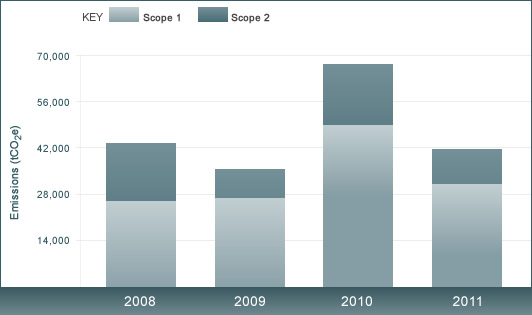Ford South America
Climate Change and the Environment
Ford is focused on minimizing the environmental impacts of our vehicles and operations, including reducing our contribution to climate change.
Ford is committed to doing our share to prevent or reduce the potential for environmental, economic and social harm due to climate change. We have a science-based strategy to reduce greenhouse gas (GHG) emissions from our products and processes that focuses on doing our share to stabilize carbon dioxide (CO2) concentrations in the atmosphere. On the product side, we have also made a commitment to deliver the most fuel-efficient vehicles in every market in which we participate. Ford South America has committed to improving fuel economy across our product lineup.
Our New Cargo Euro 5 line of trucks will have more power and better fuel economy than the Euro 3 line, even as they emit up to 80 percent fewer nitrous oxide emissions. Our newest launch in the Brazilian market, the new Ford Fiesta, is equipped with the Taubaté-produced Sigma engine with our advanced flex-fuel technology. This technology allows drivers to optimize fuel economy and reduce emissions by using environmentally friendly Brazilian ethanol. During the Buenos Aires Autoshow, Ford also launched the new Ford Mondeo with an Ecoboost® engine, which represents the arrival of green technologies to Argentina.
Ford is also using recycled and/or natural material in our vehicles in South America. All vehicles locally produced use 5 to 7 kg of recycled PET plastic in the form of carpets, ceiling linings, wheel boxes and acoustic blanket carpeting. And, the dashboard panel of the new Cargo trucks is made with sisal natural fiber.
We are the first automobile company in Brazil to voluntarily report our facilities’ GHG emissions to the Brazilian Greenhouse Gas Protocol. As a participant and one of the founders of the Protocol, we have conducted an inventory of our facility emissions and have set reduction goals. The results of the inventory can be seen in the graph below. Absolute GHG emissions went up in 2010 as a result of production increases. However, our GHG emissions per unit of production decreased by 1 percent due to process efficiency improvements.
Historical Emissions by Scope
Chart

Table
| Ano | Emissões (tCO2e) | |
|---|---|---|
| Escopo 1 | Escopo 2 | |
| 2008 | 25.925,00 | 17.392,00 |
| 2009 | 26.826,00 | 8.758,00 |
| 2010 | 48.834,23 | 18.620,00 |
Ford Argentina participated in BIO Plan, a program sponsored by the Sustainable Development Organization of the Province of Buenos Aires that collects used vegetable cooking oil and transforms it into a biofuel similar to kerosene. Through this program, we are now recycling the cooking oil from the Pacheco plant’s cafeteria.
Finally, Ford employees in Brazil also celebrated World Environment Week, as well as the “Day of the Tree,” which marks the arrival of spring. Employees at the Camacari, Sao Bernardo do Campo, Troller, Taubate and Tatui facilities, as well as the Miguel de Oliveira Port, took part in a variety of environmentally focused events, ranging from workshops and lectures to nature walks and site visits. At several locations, employees were given plants and seeds for their gardens.
For a discussion of our global climate change impact and commitments, please see the Climate Change and the Environment section.
